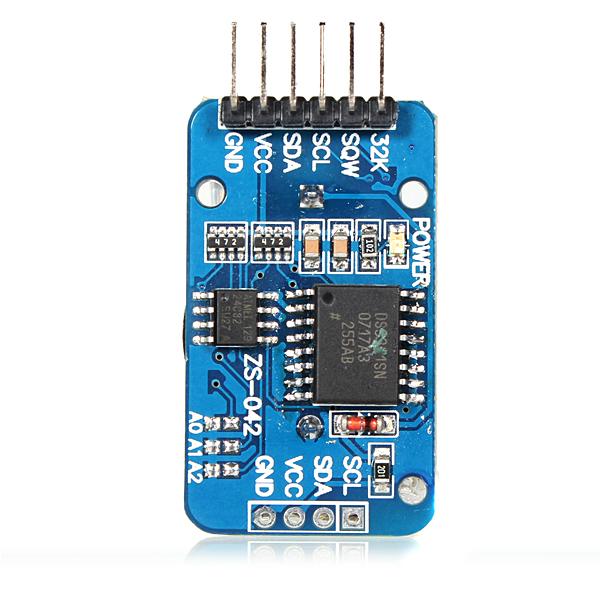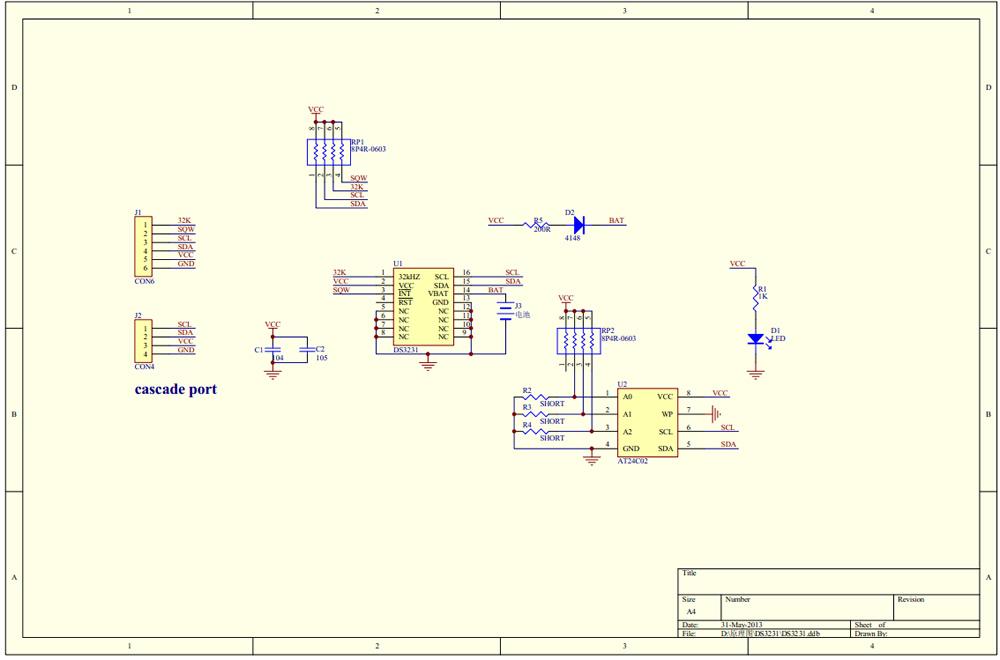The DS3231 is a low-cost, extremely accurate I2C real-time clock (RTC) with an integrated temperature-compensated crystal oscillator (TCXO) and crystal.
The device incorporates a battery input, and maintains accurate timekeeping when main power to the device is interrupted.
Features
Highly Accurate RTC Completely Manages All Timekeeping Functions
Real-Time Clock Counts Seconds, Minutes, Hours, Date of the Month, Month, Day of the Week, and Year, with Leap-Year Compensation Valid Up to 2100
Accuracy ±2ppm from 0°C to +40°C
Accuracy ±3.5ppm from -40°C to +85°C
Digital Temp Sensor Output: ±3°C Accuracy
Two Time-of-Day Alarms
Programmable Square-Wave Output Signal
Simple Serial Interface Connects to Most Microcontrollers
Fast (400kHz) I2C Interface
Battery-Backup Input for Continuous Timekeeping
Low Power Operation Extends Battery-Backup Run Time
3.3V Operation
This is a very common module that can be bought

Here is a schematic

Parts List
Here are the parts I used
| Name | Links | |
| Wemos Mini | ||
| DS3231 | ||
| Connecting cables |
Connection
| Wemos Pins | Module Pins |
| GND | GND |
| 3v3 | VCC |
| D2 | SDA |
| D1 | SCL |
Code
This uses the RTCLib – https://github.com/adafruit/RTClib
#include <Wire.h>
#include "RTClib.h"
RTC_DS3231 rtc;
char daysOfTheWeek[7][12] = {"Sunday", "Monday", "Tuesday", "Wednesday", "Thursday", "Friday", "Saturday"};
void setup () {
#ifndef ESP8266
while (!Serial); // for Leonardo/Micro/Zero
#endif
Serial.begin(9600);
delay(3000); // wait for console opening
if (! rtc.begin()) {
Serial.println("Couldn't find RTC");
while (1);
}
if (rtc.lostPower()) {
Serial.println("RTC lost power, lets set the time!");
// following line sets the RTC to the date & time this sketch was compiled
rtc.adjust(DateTime(F(__DATE__), F(__TIME__)));
// This line sets the RTC with an explicit date & time, for example to set
// January 21, 2014 at 3am you would call:
// rtc.adjust(DateTime(2014, 1, 21, 3, 0, 0));
}
}
void loop () {
DateTime now = rtc.now();
Serial.print(now.year(), DEC);
Serial.print('/');
Serial.print(now.month(), DEC);
Serial.print('/');
Serial.print(now.day(), DEC);
Serial.print(" (");
Serial.print(daysOfTheWeek[now.dayOfTheWeek()]);
Serial.print(") ");
Serial.print(now.hour(), DEC);
Serial.print(':');
Serial.print(now.minute(), DEC);
Serial.print(':');
Serial.print(now.second(), DEC);
Serial.println();
Serial.print(" since midnight 1/1/1970 = ");
Serial.print(now.unixtime());
Serial.print("s = ");
Serial.print(now.unixtime() / 86400L);
Serial.println("d");
// calculate a date which is 7 days and 30 seconds into the future
DateTime future (now + TimeSpan(7,12,30,6));
Serial.print(" now + 7d + 30s: ");
Serial.print(future.year(), DEC);
Serial.print('/');
Serial.print(future.month(), DEC);
Serial.print('/');
Serial.print(future.day(), DEC);
Serial.print(' ');
Serial.print(future.hour(), DEC);
Serial.print(':');
Serial.print(future.minute(), DEC);
Serial.print(':');
Serial.print(future.second(), DEC);
Serial.println();
Serial.println();
delay(3000);
}
Links
https://www.analog.com/media/en/technical-documentation/data-sheets/ds3231.pdf


Hi, I read your text about RTC and its connection to Wemos. The RTC has the SQW pin, which is used to wake Arduin by interrupt, to the INT INT (interrupt). Wemos pin INT is bountiful. Is it possible to wake it up with (external) RTC? I do not mean deep sleep mode and timing using the Wemos internal RTC board, but wake up in eg a preset time by interrupting. Thank you
[…] Wemos and DS3231 RTC example Biblioteka z Adafruit […]